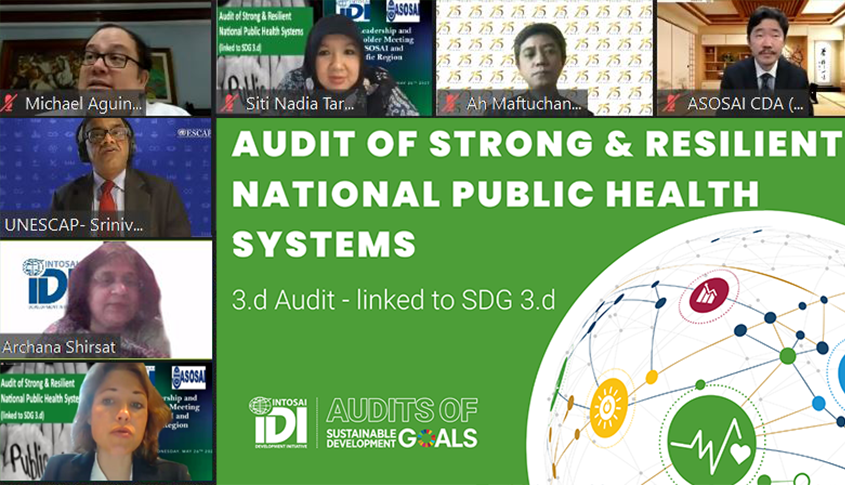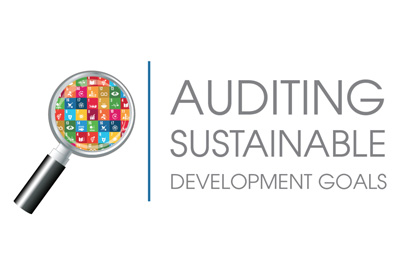About IDI
Our Cross-Cutting Priorities
Our Results
Meet the IDI Board
IDI's Board is composed of ten members from different supreme audit institutions. Get to know them better in our "Meet the Board" series.

What is public health resilience? What are SAIs expected to audit as they conduct performance audits of national public health resilience linked to SDG target 3.d (3.d audits)? What value do key global, regional and national stakeholders see that the 3.d audit can bring? How can these stakeholders support and/or work together with the SAIs in undertaking these audits and to enhance audit impact?
Organised jointly by IDI and ASOSAI CDA, heads and audit staff from the 16 SAIs participating in the SDG 3.d audits in the ASOSAI and PASAI regions and key stakeholders convened to discuss these questions in a recent virtual meeting.
What is health system resilience and what are SAIs expected to audit?
Health system resilience can be defined as the capacity of health actors, institutions, and populations to manage risks, prevent, prepare for, absorb, adapt to and effectively respond and recover from the effects of a hazard in a timely and efficient matter while maintaining its essential functions; and, informed by lessons learned during the crisis, re-organise and transform as necessary.1
A resilient health system implies that there is a multifaceted, multisectoral, whole-of-society approach for public health emergencies. Building upon this conceptual introduction, the performance audits (3.d audits) will focus on how government has acted on lessons learned to enhance capacities
Pending on the relevant context and risks in a given country, SAIs may choose to focus on all these capacities, while others may concentrate on some capacities only. It is, however, pertinent to include the capacities related to preparedness as a minimum focus for the audits.
Moreover, these audits are expected to follow the specific requirements of any performance audit of SDG implementation – focusing on a whole-of-government approach, policy coherence and integration, assessing government efforts at leaving no one behind and multi-stakeholder engagement in implementing the SDG target under audit.
Adding value and focusing on audit impact
IDI encourages SAIs to engage with key stakeholders throughout the audit process and focus on the impact of their audit work, mainstreaming the audit impact considerations throughout the audit as outlined in IDI's SDGs Audit Model (ISAM).
How do other stakeholders view the potential value added by the 3.d audits and focus on impact and building back better?
Speakers from the World Health Organization (WHO), the United Nations Economic and Social Commission for Asia and the Pacific (UNESCAP), civil society organisations, government offices and SAIs reflected on this question during the meeting.
Participants noted that the upcoming 3.d audits will force governments to become more forward-looking by planning for future emergencies that occur on a regular basis.
Moreover, it was stressed that it will be important to see how the current political impetus arising from COVID-19 can be harnessed and translated into policies and approaches which consider health as an essential element of economic recovery. It will be important to see how stakeholders can work with governments to come up with an integrated approach to planning.
Reflecting on the audits, a point that was shared was that the audits need to approach public health resilience as being part of a wider national system – recognising the interdependencies involved in strengthening public health resilience through work across government and sectors – horizontally and vertically. To strengthen health systems in general – there is a need to see how the different mechanisms can assist in strengthening it –including developing the inherent capacities required.
The unavaoidable need for a SAI to engage with its stakeholders in the process of conducting an audit was noted as well. For such audits to success, there is a need for a multisectoral and multi-stakeholder approach.
You can see the full agenda of the meeting here and read more about the 3.d audits here.
1. adapted from Kruk, M.E, Myers, M, Varpilah, S.T and Dahn, B.T (2015) "What is a resilient health system? Lessons from Ebola". Lancet, 385: 1910-12
| For more information about IDI's Auditing the SDGs initiative, please click on the logo. |  |